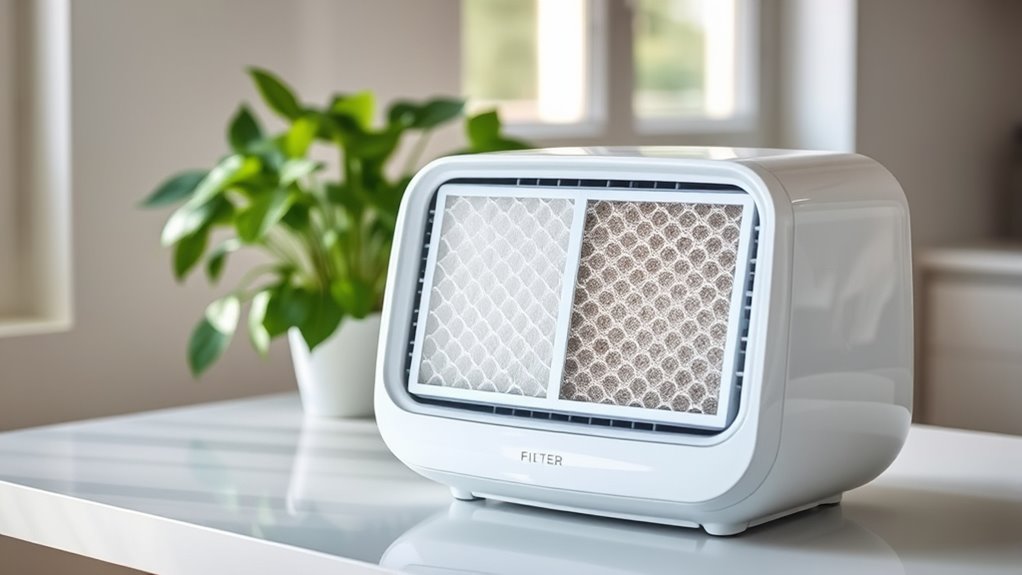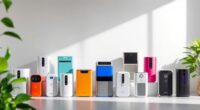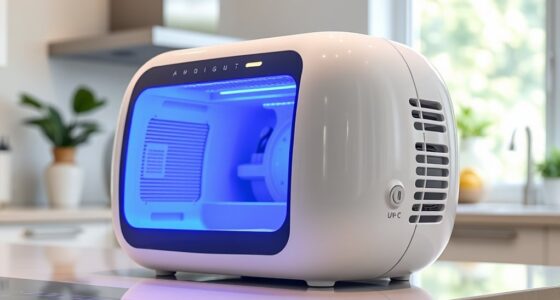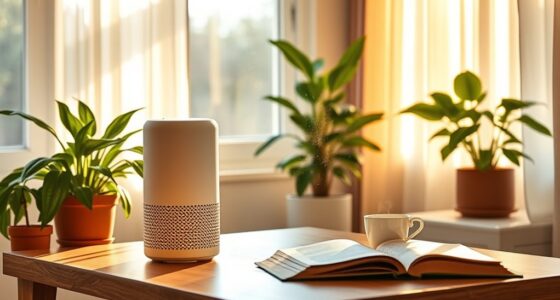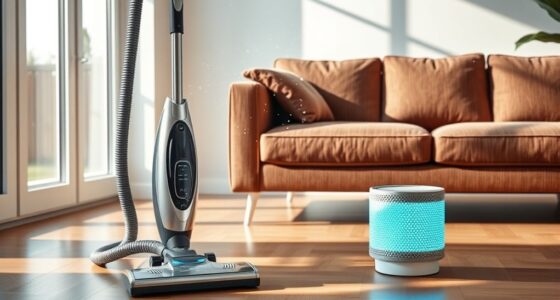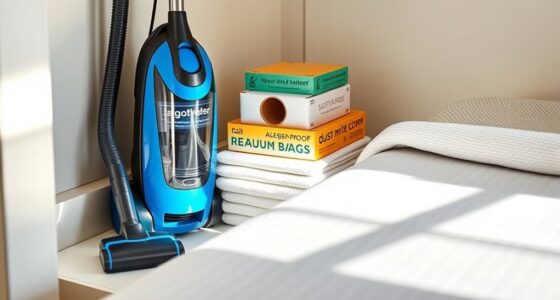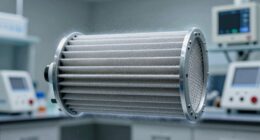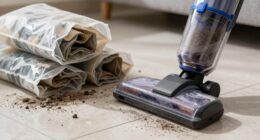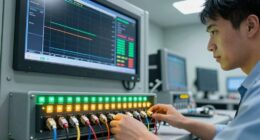Regular filter replacement in air purifiers is essential for keeping your indoor air clean and improving overall performance. When filters become clogged, they can’t trap allergens and pollutants effectively, leading to poor air quality and increased energy costs. By changing filters regularly, you guarantee efficient airflow and extend the lifespan of your unit. Plus, clean filters can save you money on energy bills. Discover more about maintaining your air purifier for the best results.
Key Takeaways
- Regular filter replacement ensures effective trapping of pollutants, significantly improving indoor air quality.
- Timely maintenance prevents airflow restrictions, enhancing air purifier efficiency and reducing energy costs.
- Clogged filters can lead to poor air quality and potential health risks due to circulating harmful particles.
- Frequent filter changes extend the lifespan of air purifiers by reducing stress on the system.
- Adhering to replacement schedules maintains optimal performance and reduces the frequency of surface cleaning due to dust and allergens.
How Air Purifier Filters Work
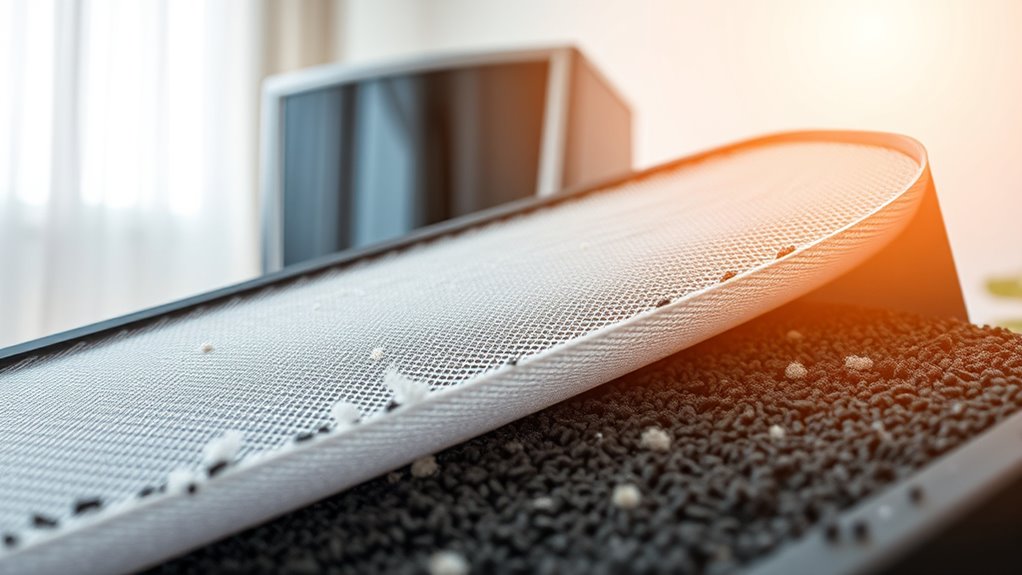
When you turn on an air purifier, it pulls in air and forces it through a network of fibers and holes in the filter.
An air purifier draws in air, pushing it through a filter’s fibers to capture pollutants effectively.
These air purifier filters trap various airborne pollutants, including pet dander, dust, pollen, smoke, and even viruses. As air passes through, particles collide with the fibers, effectively cleaning the air and improving indoor air quality. Air purifiers with HEPA filtration are particularly effective, as they capture up to 99.97% of particles as small as 0.3 microns. Additionally, units with activated carbon filters are excellent for eliminating odors and VOCs, further enhancing air quality. Regular cleaning processes vary by model, so it’s important to follow manufacturer guidelines for optimal performance. Moreover, regular use of air purifiers can lead to improved respiratory health, especially for those with asthma or allergies.
You can think of it like a food strainer, separating clean air from impurities. Filters vary in type, such as HEPA or activated carbon, each designed to target specific pollutants.
To maintain peak performance, regular filter replacement is essential; otherwise, impurities can build up and re-enter your indoor environment, defeating the purpose of purification. Additionally, HEPA filters are designed to capture up to 99.97% of airborne particles, making filter maintenance even more crucial for effective air purification. Consistent maintenance can prevent costly repairs and replacements.
Benefits of Regular Filter Replacement
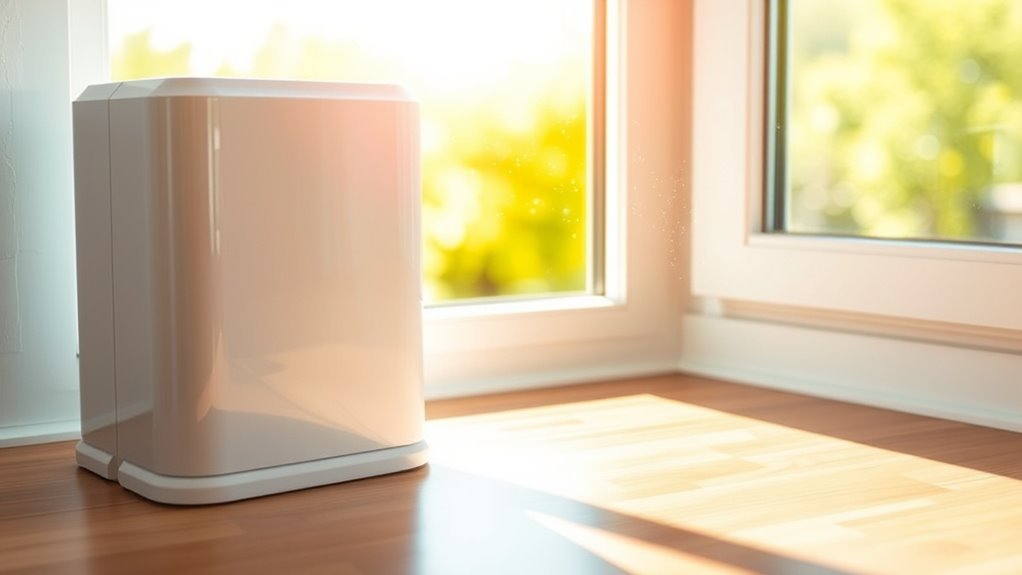
Regular filter replacement brings numerous benefits that directly impact your home’s air quality.
By ensuring you have a clean air filter, you effectively trap pollutants like dust, pollen, and pet dander, making your living environment healthier. Regular maintenance can also enhance the performance of devices such as home security systems, which rely on optimal air quality to function effectively. Additionally, maintaining a clean environment can help reduce the frequency of airless paint sprayers needing to be cleaned, as dust and allergens can settle on surfaces. Keeping your home free of allergens is essential, especially when considering the impact of a clean air filter on your overall health. Regularly changing filters can also prevent issues related to high dust accumulation that may compromise air purifier performance.
Timely changes help maintain peak air purification performance, preventing indoor air pollution from harmful particles recirculating.
This not only reduces health risks associated with respiratory issues but also improves the efficiency of your air purifier.
You’ll notice energy savings of up to 15% when filters are regularly replaced, as clean filters allow for better airflow.
Plus, routine maintenance can prolong your air purifier’s lifespan, sparing you from costly repairs due to mechanical strain from dirty filters. Additionally, regular filter changes ensure optimal performance of HEPA filters, which are crucial for removing airborne pollutants.
Preventing Clogged Filters
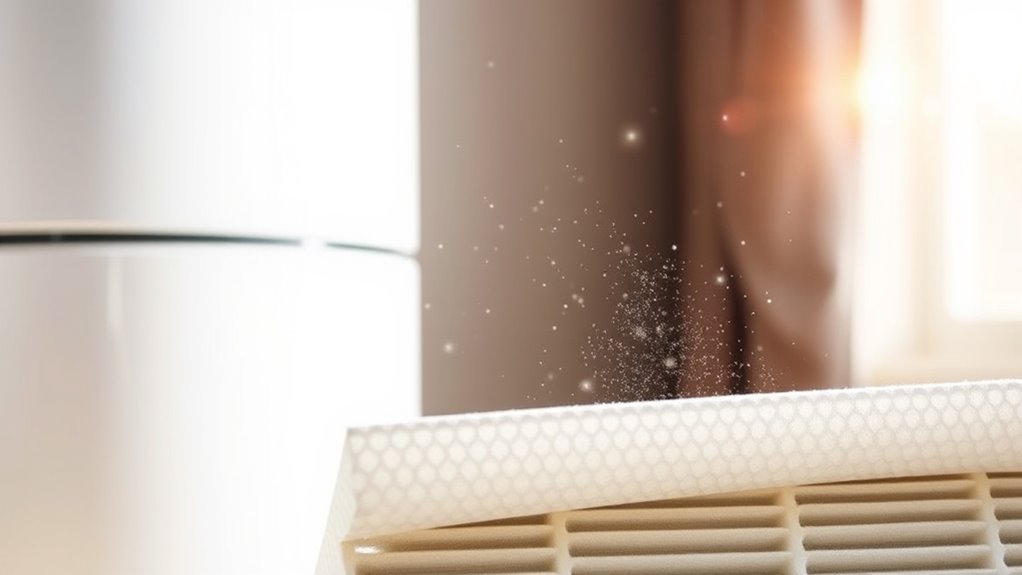
Clogged filters can seriously restrict airflow in your air purifier, making it harder for the device to do its job. When airflow is limited, you’re likely to notice a drop in system performance and air quality. Regular maintenance, including filter replacement, is essential to ensure your air purifier operates efficiently and effectively. Additionally, regular cleaning of the stovepipe and chimney is important for maintaining overall system efficiency. To achieve optimal performance, consider the impact of color accuracy on air quality, as the visual clarity in your environment can enhance your overall well-being. Furthermore, just like freshly squeezed juice, which lasts only 2-3 days before it spoils, fresh air quality can deteriorate quickly if filters are not replaced regularly. Engaging in regular maintenance can help mitigate cognitive decline associated with poor air quality, ultimately benefiting your overall health.
Airflow Restriction Consequences
Ignoring the importance of filter replacement can lead to serious airflow restrictions in your air purifier. Clogged filters restrict airflow, forcing your purifier to work harder, which reduces its efficiency in removing harmful particles. Just like congested sinuses make breathing difficult, clogged filters impede airflow, raising the risk of breakdowns and costly repairs. Additionally, maintaining indoor air quality is crucial, as it directly impacts your health and comfort. Regular maintenance of systems like air purifiers, similar to that of heat pumps, can enhance efficiency and prolong their lifespan. Proper airflow is essential for the refrigeration cycle, as it ensures optimal heat exchange and system performance. Airless paint sprayers, for example, utilize high pressure to ensure smooth application and prevent clogs.
Here’s a quick overview of the consequences of airflow restriction:
| Consequence | Description | Impact |
|---|---|---|
| Increased Energy Use | Overworked purifiers consume more power | Higher utility bills |
| Poor Air Quality | Ineffective filtration leads to harmful air | Discomfort in your home |
| Shortened Equipment Life | Stress on the system causes premature failure | Increased repair costs |
| Maintenance Hassles | More frequent repairs needed | Inconvenience and expense |
To maintain ideal airflow, replace your filters regularly. Additionally, just like frost-free technology in freezers helps maintain efficiency, regular filter changes ensure your air purifier operates at its best.
System Performance Impact
Maintaining your air purifier’s performance hinges on timely filter replacements. Clogged filters restrict airflow and lead to decreased efficiency, causing your purifier to work harder. This not only increases energy consumption but also risks breakdowns and poor air quality.
To keep your air purifier running smoothly, remember to:
- Change filters regularly to avoid dirt and allergen build-up.
- Clean the unit to prevent it from becoming a breeding ground for bacteria and mold.
- Stay proactive with maintenance to prolong the lifespan of your device. Additionally, using HEPA filter vacuums can complement your air quality efforts by effectively trapping allergens throughout your home.
Maintaining Air Quality and Safety
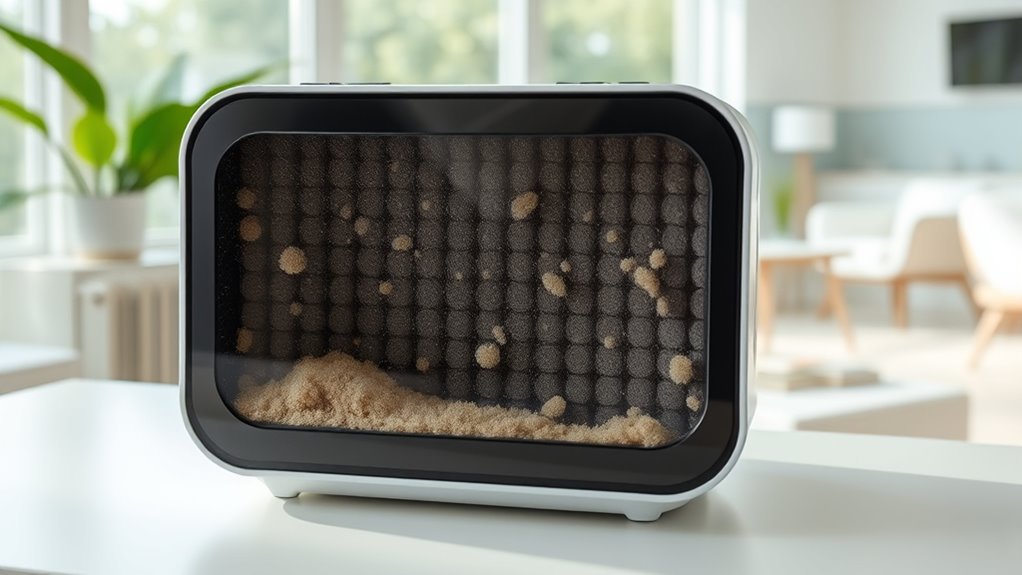
To keep your indoor air safe and healthy, you need to be aware of airborne health hazards that can arise from clogged filters.
When filters aren’t replaced regularly, they can become breeding grounds for mold and bacteria, putting your family at risk.
Regular maintenance not only enhances indoor air quality but also supports better respiratory health for everyone in your home.
Airborne Health Hazards
While many people may not realize it, the air inside your home can harbor a range of airborne health hazards that pose risks to your well-being.
Dirty air purifier filters can circulate harmful pollutants like bacteria and allergens.
To guarantee a healthier living space, it’s essential to:
- Change your filter regularly to trap harmful particles.
- Reduce dust, pollen, and mold levels in your home.
- Lower allergy and asthma symptoms, particularly in vulnerable individuals.
Clogged Filter Risks
Neglecting to replace your air purifier’s filter can lead to serious risks for your indoor air quality and safety.
Clogged filters greatly reduce airflow, making your air purifier less efficient and potentially causing it to fail. When dirt and debris accumulate, harmful particles can circulate, increasing the risk of respiratory issues and allergies.
Regularly replacing filters prevents bacteria and mold buildup, which can thrive in neglected filters. Additionally, a clogged filter forces your air purifier to work harder, raising energy consumption and utility bills.
In extreme cases, the dust accumulation can even create fire hazards, posing a serious safety risk.
Don’t compromise your health—stay proactive and make sure you’re replacing filters to maintain effective air purification.
Enhancing Indoor Air Quality
Replacing air purifier filters regularly not only prevents clogged filters but also plays a significant role in enhancing indoor air quality. Clean filters effectively trap and remove allergens in the air, ensuring a healthier environment for you and your family.
When you stay on top of filter replacements, you help:
- Reduce respiratory issues linked to airborne contaminants like pet dander and pollen.
- Improve airflow, allowing your air purifiers to work efficiently.
- Create a safer space, especially for children, the elderly, or those with health conditions.
Neglecting to replace filters can lead to poor air quality and increased allergy symptoms.
Energy Efficiency and Cost Savings
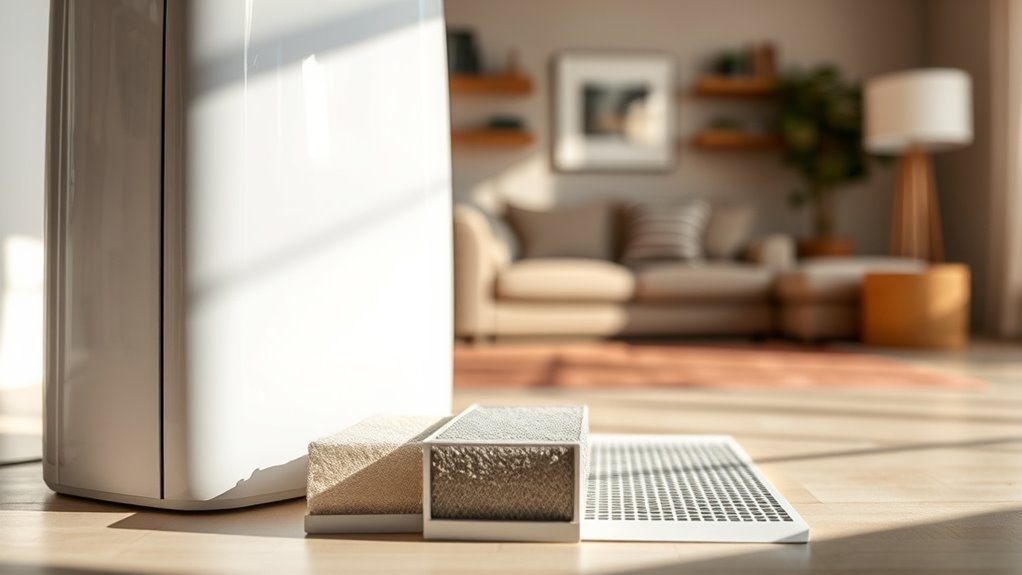
When you regularly change the filters in your air purifier, you not only enhance its performance but also save on energy costs.
Clean filters improve airflow, allowing your device to operate efficiently, which can lead to a potential reduction of up to 15% in energy expenses. By maintaining your filters, you help prevent the purifier from working harder than necessary, reducing electricity consumption and extending its lifespan.
This energy efficiency translates into significant cost savings over time, as you’ll avoid higher utility bills and costly repairs from an overworked system.
Plus, timely filter changes support eco-friendly practices, contributing to lower energy consumption and benefiting both your wallet and the environment.
Factors Affecting Filter Lifespan

Several factors influence how long your air purifier filters last, making it crucial to understand their impact. Recognizing these factors can help you avoid unnecessary hassle when changing filters.
Understanding the key factors that affect air purifier filter lifespan can help streamline your maintenance routine.
- Run time: Constant operation (24/7) can lead to quicker clogging, while intermittent use may prolong filter life.
- Material quality: Higher quality filters typically last longer and resist clogging better than cheaper alternatives.
- Environmental pollution: In areas with high dust and allergens, you’ll need to replace filters more frequently, especially HEPA air filters.
To maximize filter lifespan, adhere to manufacturer guidelines and maintain regular maintenance.
Signs That It’s Time to Replace Your Filter
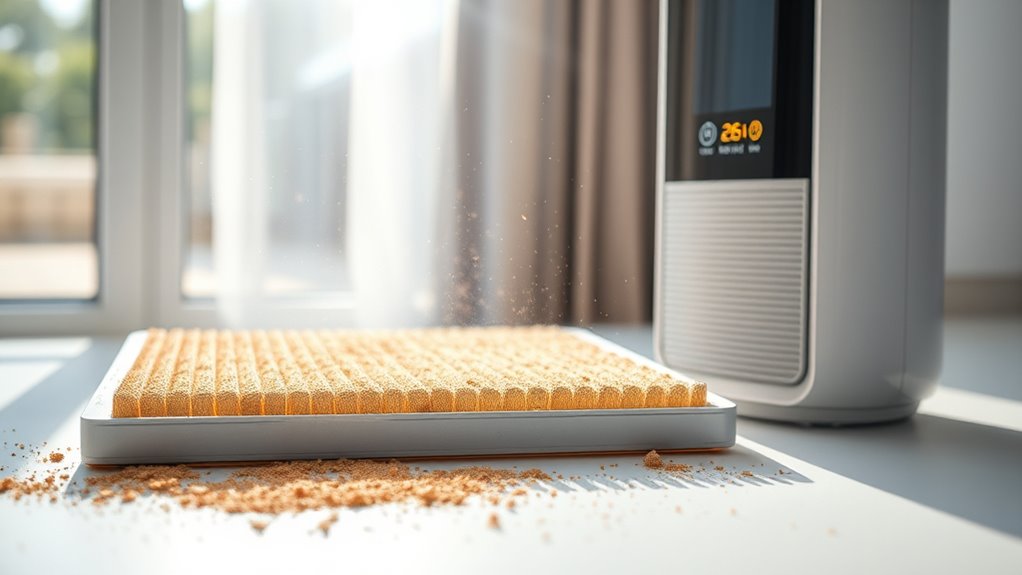
How can you tell if it’s time to replace your air purifier filter? First, check for built-in filter indicators; many air purifiers alert you when it’s time for a change.
Next, perform visual inspections—look for discoloration or excessive dust accumulation on the filters. If you notice persistent unpleasant odors, it could mean the VOC filter needs servicing.
Additionally, if you experience increased allergy symptoms or respiratory issues, that’s a sign your filter isn’t trapping airborne particles effectively.
Finally, remember that, per manufacturer guidelines, main filters usually need replacement every 12 months, while pre-filters should be changed every 6 months to maintain peak performance.
Regularly monitoring these signs will help guarantee your air purifier functions efficiently.
Best Practices for Air Purifier Maintenance
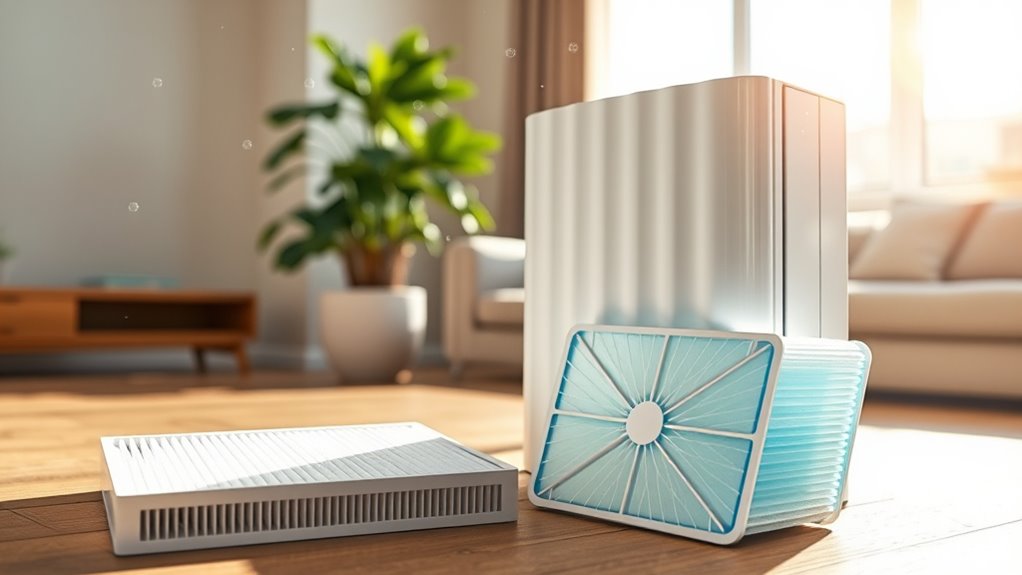
To keep your air purifier functioning at its best, regular maintenance is essential. Adhering to the manufacturer’s guidelines for filter replacement and cleaning can greatly extend the life of your device.
Regular maintenance is crucial for optimal air purifier performance; follow the manufacturer’s guidelines for filter care.
Here are some best practices to follow:
- Clean or replace filters every 12 months for main filters and every 6 months for pre-filters.
- Use built-in filter indicators to remind you when it’s time for a change.
- Monitor environmental factors, like pollution levels, to adjust your replacement schedule as needed.
Frequently Asked Questions
What Is the Importance of Replacing Air Filter?
Replacing air filters is essential for keeping your air clean and healthy.
When you don’t change them regularly, they can get clogged, reducing airflow and performance. This means more allergens and dust in your space, which isn’t good for your health.
Plus, dirty filters can lead to increased energy costs as your system works harder.
What Happens if You Run an Air Purifier With a Dirty Filter?
Running a ragged air purifier with a dirty filter can be disastrous.
It’ll struggle to suck up pollutants, pushing dust and allergens back into your space instead. You might notice your allergies acting up, or even respiratory issues worsening.
Plus, you’ll pay more on your energy bill as the unit works overtime. Ignoring that filthy filter could even lead to overheating, causing permanent damage to your purifier.
Keep it clean for clear air!
Why Is It Important to Change Air Filters on a Regular Schedule?
Changing air filters on a regular schedule is essential for keeping your air purifier running efficiently.
When you don’t replace them, they get clogged, making your purifier work harder and increasing energy costs.
You also risk allowing harmful particles like allergens and bacteria to circulate in your home, which can worsen respiratory issues.
Are There Air Purifiers That Don’t Need Replacement Filters?
You won’t believe the magic of air purifiers that don’t need replacement filters!
Yes, there are models with washable and reusable filters that you can clean instead of tossing out. Some even boast advanced technologies like electrostatic or UV light systems, making them super efficient.
Just remember, while you won’t be replacing filters often, you’ll still need to clean them regularly to keep your air fresh and healthy.
Conclusion
To summarize, think of your air purifier filter like a sponge soaking up dirt and pollutants. Over time, that sponge gets full and can’t absorb any more, leaving your air quality compromised. By regularly replacing the filter, you guarantee your air purifier works efficiently, maintaining a clean and safe environment for you and your loved ones. Just like changing a sponge keeps your kitchen fresh, timely filter replacements keep your air pure and revitalizing.
